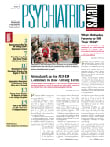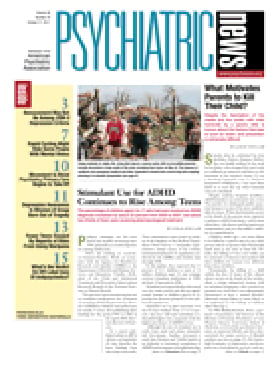Benefits and adverse effects vary among atypical antipsychotics used for off-label conditions, with no evidence supporting their use for several conditions—eating disorders, substance abuse, and insomnia—for which they are sometimes used.
That was the finding from a meta-analysis of efficacy and comparative effectiveness of atypical antipsychotic medications used for off-label conditions published in the September 28 Journal of the American Medical Association.
Small but statistically significant effects were found for aripiprazole, olanzapine, and risperidone in the treatment of dementia in the elderly. Quetiapine was found effective for generalized anxiety disorder, and risperidone for obsessive-compulsive disorder, but all of the antipsychotics had side effects of varying degrees of severity in all conditions for which they were prescribed (see
Key Findings From Antipsychotic Study).
"Given the side-effect profiles of these medications, it is important that we know the basis for which we can expect a response when prescribing them," lead author Alicia Ruelaz Maher, M.D., told Psychiatric News. "This study helps establish a basis in certain conditions and reveals that there may not be a basis in others." She is a researcher with the RAND Corp. and a psychiatrist at the Akasha Center for Integrative Medicine in Santa Monica, Calif.
Ruelaz Maher and colleagues used six databases (PubMed, EMBASE, CINAHL, PsycInfo, Cochrane DARE, and CENTRAL) for controlled trials comparing an atypical antipsychotic medication with placebo, another atypical antipsychotic medication, or other pharmacotherapy for conditions lacking approval for labeling and marketing by the Food and Drug Administration.
Atypicals included risperidone, olanzapine, quetiapine, aripiprazole, ziprasidone, asenapine, iloperidone, and paliperidone. Observational studies with sample sizes of greater than 1,000 patients were included to assess adverse events. A total of 162 studies contributed data to the review.
The researchers found that among 14 placebo-controlled trials of elderly patients with dementia reporting a total global outcome score that included symptoms such as psychosis, mood alterations, and aggression, small but statistically significant effects sizes ranging from 0.12 and 0.20 were observed for aripiprazole, olanzapine, and risperidone.
A pooled analysis of three trials showed that quetiapine was associated with a 26 percent greater likelihood of a favorable response—defined as at least 50 percent improvement on the Hamilton Anxiety Scale—compared with placebo. Risperidone for the treatment of obsessive-compulsive disorder was associated with a 3.9-fold greater likelihood of a favorable response—defined as a 25 percent improvement on the Yale-Brown Obsessive Compulsive Scale—compared with placebo. The pooled analysis of six studies of quetiapine monotherapy for generalized anxiety disorder found a 26 percent increase in the chance of a favorable response at eight weeks.
Evidence did not support the use of olanzapine for eating disorders and was mixed regarding personality disorders. It also did not support the use of atypical antipsychotic medications for substance abuse, Ruelaz Maher and colleagues reported.
Adverse events were found across medications and conditions. In elderly patients, adverse events included an increased risk of death, stroke, extrapyramidal symptoms, and urinary-tract symptoms.
In nonelderly adults, adverse events included weight gain (particularly with olanzapine), fatigue, sedation, akathisia (for aripiprazole), and extrapyramidal symptoms. In 11 studies with a total sample size of 818, olanzapine was associated with 382 adverse weight gain events, for a pooled odds ratio of 11.3. Pooled odds ratios for adverse weight gain for other atypicals ranged from 1.2 for ziprasidone to 4.2 for aripiprazole.
"There have been substantial increases in the off-label use of these medications, but this study suggests there is little evidence to support their use and that the medications come with substantial risks," Stephen Marder, M.D., who was not involved in the study, told Psychiatric News. "It should cause clinicians to rethink their use of these drugs for some off-label conditions."
Marder, an attending psychiatrist at UCLA's Psychosis Clinic and director of the Section on Psychosis at the UCLA Semel Institute, has studied the pharmacology of antipsychotics. He was the 2004 recipient of the American Psychiatric Foundation's Alexander Gralnick, M.D., Award for Research in Schizophrenia.
Marder called the beneficial findings for quetiapine in the treatment of generalized anxiety disorder and risperidone for OCD "encouraging." But evidence did not support the use of quetiapine for insomnia, a condition for which it is not infrequently prescribed, he noted.
Ruelaz Maher emphasized that the prescription of antipsychotics for off-label conditions should be guided by the clinical needs of individual patients. "Whether or not to use these medications should be decided based on the specific symptoms of an individual, the effectiveness of other interventions, the value of modest symptomatic improvement, and the individual's personal susceptibility to and consequences of adverse effects," she told Psychiatric News.

